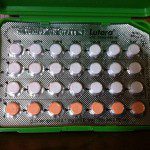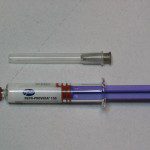You’ve perhaps read one of the stories about new apps for tracking your cycle for the purpose of avoiding conception. The most popular of these seems to be Kindara, which is an app that allows users to track their fertility signs, and is paired with an optional companion thermometer, the “Wink,” that syncs with the app to simplify the process.
Is Kindara FDA approved? No, presumably because you don’t need FDA approval for an app, any more than a book teaching natural family planning/fertility awareness*, such as Taking Charge of Your Fertility, requires approval. What about the Wink? There’s a big disclaimer on the site:
Wink and Kindara are intended to help the user record and track basal temperatures, and are not intended for use in the diagnosis of disease or other conditions, including a determination of the state of health, in order to cure, mitigate, treat, or prevent disease or its sequelae.
(* Natural family planning and fertility awareness method are distinguished by, in the first case, abstaining, and in the second method, using a barrier method on unsafe days.)
But there are other products, on the market in Europe as contraceptive devices*, that you won’t find here:
(*Yes, there’s probably some legalese about what a contraceptive device is, but they market their ability to help the use not get pregnant, with a high degree of reliability, by identifying fertile days.)
Lady-Comp is a device that tracks your BBT.
Cyclo-Test does the same.
Persona identifies safe days by using test strips. Basically it’s the ClearBlue Easy ovulation tester programmed differently.
None of these have FDA approval. In fact, in trying to find out more about the Lady-Comp, I came across three different complaint letters from the FDA, in 2010 to two individuals, and another in 2013, chock full of legalese, which seemed to be saying that the manufacturer did not follow the required extensive array of FDA “medical device” requirements, but this was followed by another letter in 2014 saying that they had in fact remedied the FDA complaints. But on the Lady-Comp site, they have the general disclaimer that
By completing this purchase you agree and understand that Lady-Comp / Lady-Comp baby will not protect against sexual transmitted diseases and that if used in the prescribed method will assure effectiveness of 99.3%. Lady-Comp is an FDA cleared Fertility Monitor and not FDA approved as a Contraceptive method or device.
Now, as it happens, Lady-Comp is actually available online in the U.S. Not so for Cyclo-Test or Persona — you can look at these products at amazon.co.uk but there’s a warning that they won’t ship to the U.S. I don’t know if it’s because the former actually got clearance from the FDA, even if in the limited form of a generic “fertility monitor” without any family planning claims, or if there’s some other reason.
But none of these devices show up on any list of “FDA approved contraceptive devices.”
And this matters.
“Not FDA approved” is synonymous with “unreliable,” and keeps NFP/FAM relegated to the list of “only if you’re crazy or stupid would you do this” alongside “the pull-out method,” even though many women don’t want to dose their body with hormones for most of their adult lives — and, in the Obamacare world, it’s the difference between paying out of pocket and getting your insurance to pay.
And hence, here are the questions:
I spent an inordinate amount of time trying to find the reasons why the FDA seemingly as policy does not approve any device for identifying safe days for NFP/FAM, and came up empty, so I’m asking readers if they have any knowledge that I don’t.
And, secondly, what do you think? Should the FDA approve these devices, given that it acts as gatekeeper in multiple ways?











